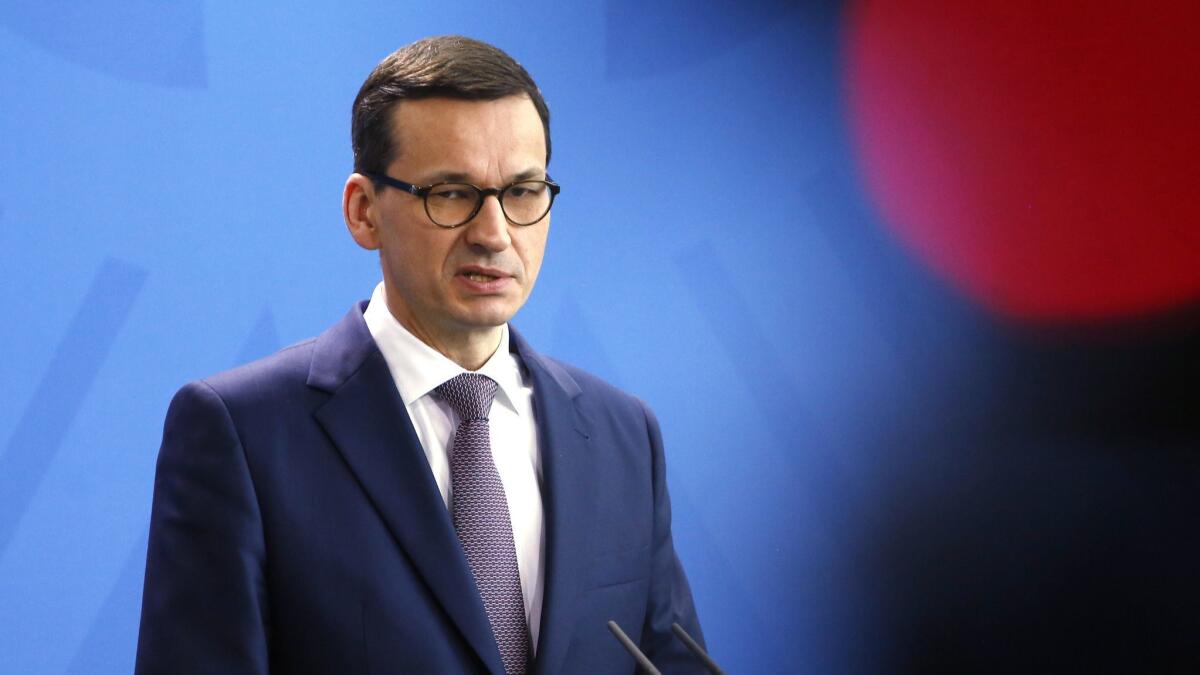Op-Ed: When Abbas spews anti-Semitic vitriol the response is thunderous. Not so much for Poland’s prime minister

- Share via
Nothing stays above politics forever, not even the Holocaust.
Earlier this week, Palestinian leader Mahmoud Abbas was caught spewing anti-Semitic vitriol, including the notion that Jews were responsible for the Holocaust. The denunciations from American Jewish leaders were swift and unequivocal. But they also rang hollow.
In February, Polish Prime Minister Mateusz Morawiecki publicly said there were “Jewish perpetrators” of the Holocaust. Morawiecki’s remark — which scholars condemned as a form of Holocaust denial — came in the wake of Warsaw’s new memory law, which made it illegal to claim that Poland had participated in the Holocaust. The law triggered a wave of anti-Semitism in Poland that shows few signs of abating. Indeed, just last month a senior Polish lawmaker tweeted that “the Jews are not humans, they are animals!”
Yet American Jewish leaders’ reaction to Morawiecki’s remark was exponentially more muted than the outrage over Abbas. Their responses were cushioned with words such as “unfortunate” and “misstatement,” stunning euphemisms considering Morawiecki is the prime minister of a nation where 60,000 people took the streets in November chanting, “Pure blood.”
This strangely restrained response of U.S. Jews is, unfortunately, all too common when it comes to the Holocaust distortion surging across Eastern Europe. On April 28, a thousand Ukrainians marched in honor of a local SS unit. The demonstration, which included Nazi salutes, capped off a week in which a Holocaust memorial was firebombed, the tomb of a rabbi was desecrated, and neo-Nazis conducted anti-Roma pogroms in the heart of Kiev. Surely these events deserve denunciation too, yet once again, American Jews were mostly silent.
American Jewish leaders’ reaction to Morawiecki’s remark was exponentially more muted than the outrage over Abbas.
There is an explanation for this reticence. American Jewish organizations spent decades campaigning for the liberation of Soviet Jews who, like the Poles and dozens of other national groups, were trapped in what President Reagan called the Evil Empire. “For your freedom and ours!” was the battle cry of those fighting communism. It was obvious that the success of any liberation movement — Jewish, Polish, Baltic — was a blow to Moscow and a victory for everyone yearning to cast off the Kremlin yoke. A lingering nostalgia for that common struggle is what keeps U.S. Jewish leaders and lawmakers from speaking out now.
My Jewish family came to America as political refugees from the Soviet Union in 1990, so I can certainly relate to the sentiment. I was in Estonia during the 1989 Singing Revolution, when hundreds of thousands took to the streets there and in Lithuania and Latvia, peacefully demonstrating for freedom. I remember the thrill of hearing news of the communist bloc falling apart, and the fierce joy later of visiting cities like Prague and marveling at how democratic nations had risen out of decades of communist oppression.
But the 1990s are gone. An illiberal ultra-nationalism is replacing that democratic impulse across Eastern Europe, particularly Poland, Hungary and my homeland Ukraine. Nearly every week, some new outrage emanates from the region. Lithuania is considering a draconian book ban aimed at whitewashing its Nazi collaborators. And with the resounding victory last month of Hungary’s prime minister, Viktor Orban, and his anti-Semitic, anti-Muslim Fidesz party, we can be sure Budapest will redouble its own campaign of glorification of Nazi collaborators.
In this disturbing climate, nostalgic equivocation and selective outrage are dangerous. When Holocaust denial is treated differently depending on which world leader utters it, politics has trumped history and remembrance. And when people who should know better are more upset about how much time an African American city councilman (Trayon White of the District of Columbia) spent in a Holocaust museum than they are about Europeans celebrating Nazi collaborators, something has gone terribly wrong.
On April 19, 1985, Elie Wiesel, the voice and soul of Holocaust survivors, demonstrated the meaning of righteous chutzpah. Wiesel was at the White House to receive the Congressional Gold Medal from Reagan, who was about to commemorate VE Day by visiting a German military cemetery where members of the SS were among the dead. “That place, Mr. President, is not your place,” Wiesel publicly admonished the leader of the free world. “Your place is with the victims of the SS.”
Wiesel died in 2016, and the number of survivors of the Nazi camps wanes every year. But as the Holocaust transitions into history, the battle over victims and perpetrators of World War II is only heating up. Indeed, one of Wiesel’s last major public acts was to renounce an award he had received from Hungary in protest of Budapest’s whitewashing of its collaboration with the Germans. That was in 2012; since then, Holocaust denial and Nazi whitewashing has only spread.
Your place in that battle, American Jews and especially American Jewish leaders, is still with the victims, the ones who never got the chance to walk the halls of Congress, and sit on boards of foundations, and thrive in the United States. Your place is not on the sidelines, and it’s not alongside those defiling the memory of the Holocaust.
Lev Golinkin is the author of the memoir “A Backpack, a Bear, and Eight Crates of Vodka.”
Follow the Opinion section on Twitter @latimesopinion and Facebook
More to Read
A cure for the common opinion
Get thought-provoking perspectives with our weekly newsletter.
You may occasionally receive promotional content from the Los Angeles Times.









